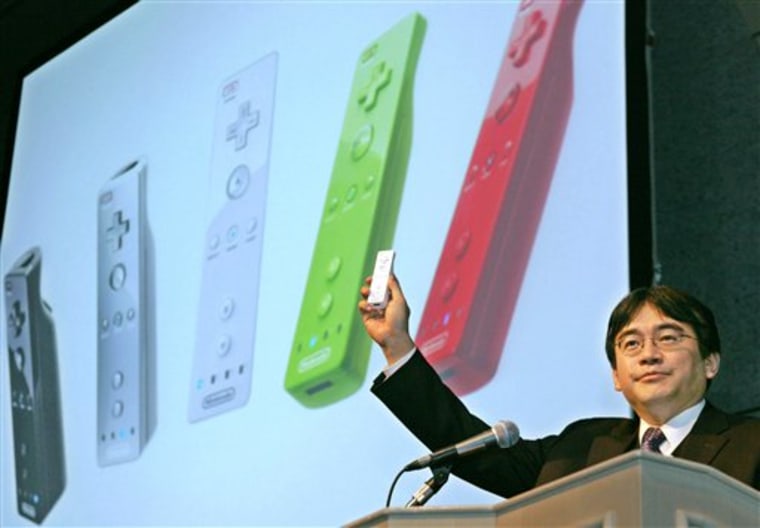Nintendo thinks it has the answer for people scared off by all the complex switches and buttons on home video-game controllers — a simpler device that looks like a TV remote control and can be waved like a wand or a baseball bat.
Nintendo showed off the controller at the Tokyo Game Show, which opened Friday and is turning into a showcase for the intensifying three-way battle among Sony, Microsoft and Nintendo Co. Ltd. in next-generation video-game consoles.
"We thought about how everyone in the family uses the TV remote, but some people don't want to even touch the game controller," Nintendo President Satoru Iwata said. "We want to set a new interface standard for games."
Iwata said games must appeal to a wider audience, including novices, if game creators hope to survive, but many people are intimidated by the many buttons now required to play.
The Kyoto-based company, famous for the Game Boy Advance handheld as well as the Super Mario and Pokemon games, has been introducing simpler-to-play games like the "Nintendogs" virtual-pet game for its Nintendo DS — a portable game machine with two screens, including a touch panel.
Equipped with a sensor at the end, the new Revolution wireless controller can be used as a virtual bat, sword, fishing rod or racket. In a demonstration video, an elderly couple were pretending to conduct an orchestra, while a younger person appeared to play a musical instrument or fire a gun.
Redmond, Wash.-based Microsoft Corp. is also aggressively pushing its next-generation Xbox 360 at the show, determined not to repeat the dismal failure of its original Xbox console in Japan — home to some of the most devoted game fans in the world and a market dominated by Sony Corp.'s PlayStation.
Microsoft has sold 21.9 million Xbox machines globally since it went on sale three years ago, but only about 1.8 million of those were sold in Asia, including Japan.
(MSNBC is a Microsoft - NBC joint venture.)
For most Japanese, the home console of choice is still Sony. The Japanese electronics and entertainment company has sold 91 million PlayStation 2 consoles worldwide over the last five years, 21 million of them in Asia. More than a 100 million of the original PlayStations have been sold worldwide.
PlayStation 3, which will go on sale next year, will be powered by a new computer chip called "cell" that Sony says will also drive digital electronics products in the works. PlayStation 3 will also use the next generation video format called Blu-ray Disk.
Eiji Maeda, an analyst at Daiwa Institute of Research in Tokyo, said Xbox 360 has a good chance of chipping away at Sony's stronghold in Japan, although Xbox still lacks brand power here.
"Things may be difficult in Japan for Xbox 360 in the beginning, but it's probably going to put up a pretty good fight," Maeda said.
And Nintendo, with its brand appeal and ability to offer innovative products, will continue to hold its own and maintain its profits against the larger rivals, he said.
Microsoft announced the Japan price of its Xbox 360 Thursday — 37,900 yen, or about $345, slightly less than the $399.99 it's charging in the U.S. It will sell for 399.99 Euros in Europe.
The Xbox 360 is scheduled to start selling Nov. 22 in North America, Dec. 2 in Europe and Dec. 10 in Japan — beating the still unpriced PlayStation 3 to the stores.
To appeal to Japanese game fans, Microsoft has made more of a point this time of signing on designers popular here to make games exclusive for Xbox 360, such as "Final Fantasy XI."
"Ninety-Nine Nights," promised for January, allows players to control an acrobatic warrior that jumps and twirls while slashing hundreds of knights or "kills" with a sweep of a sword, accumulating points and rising to higher levels of virtual superpower.
"For players, it's all about the games. No one buys a game machine for its features," Yoshihiro Maruyama, who oversees the Xbox business in Japan, told The Associated Press recently.
Maruyama acknowledged it may take time to wrest people away from PlayStation games, and getting a head start alone won't be enough.
But he said he believes it's possible because he has witnessed Nintendo, once an industry leader in home consoles with the Family Computer, or Famicom, during the 1980s, eventually take a beating from Sony. Worldwide sales of Nintendo's home console GameCube lag behind PlayStation 2 and Xbox at about 18.8 million.
"I just don't think there's any brand loyalty in the video-game business," Maruyama said.
